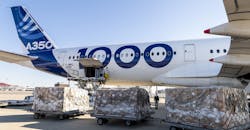Airbus to End A350 Subsidies, Seeks to Counter USTR Tariffs
Airbus SE reported an agreement with the governments of France and Spain to amend the A350 Repayable Launch Investment (RLI) contracts — essentially, subsidies provided by the two countries to support new aircraft model development. The value and terms of the changes to the agreements were not detailed.
The A350 is a twin-engine, widebody aircraft introduced by Airbus in 2013.
"After 16 years of litigation at the World Trade Organization, this is the final step to stop the long-standing dispute and removes any justification for U.S. tariffs," Airbus announced. "With this final move, Airbus considers itself in complete compliance with all WTO rulings," it added.
The WTO appellate panel is weighing an Airbus request to impose tariffs on exported U.S. goods – comparable to the clearance given last fall to the U.S., an appeal that granted the go-ahead for up to $7.5 billion annually of tariffs on European Union exports to the U.S.
The WTO panel's decision has been delayed for an unknown time, apparently due to disruptions stemming from the pandemic and the work outages that resulted from it.
Both cases stem from a dispute reaching back more than a decade over subsidies to Airbus (by individual EU member nations) and Boeing (by the U.S. and the State of Washington.) Both the European Union and the U.S. were determined to have given illegal subsidies to (respectively) Airbus and Boeing.
In a parallel move earlier this year, Washington repealed a state tax provision that particularly benefited Boeing over several years.
Airbus, however, further noted that tariffs imposed by the U.S. Trade Representative are "harming all targeted industry sectors, including U.S. airlines, and are adding to a very difficult environment as a consequence of the COVID-19 crisis."
Airbus CEO Guillaume Faury called the agreement “a clear signal of support to those who are suffering from the severe impact of the tariffs imposed by the USTR, especially at a time when industries are hard hit by the consequences of the COVID-19 crisis.”
